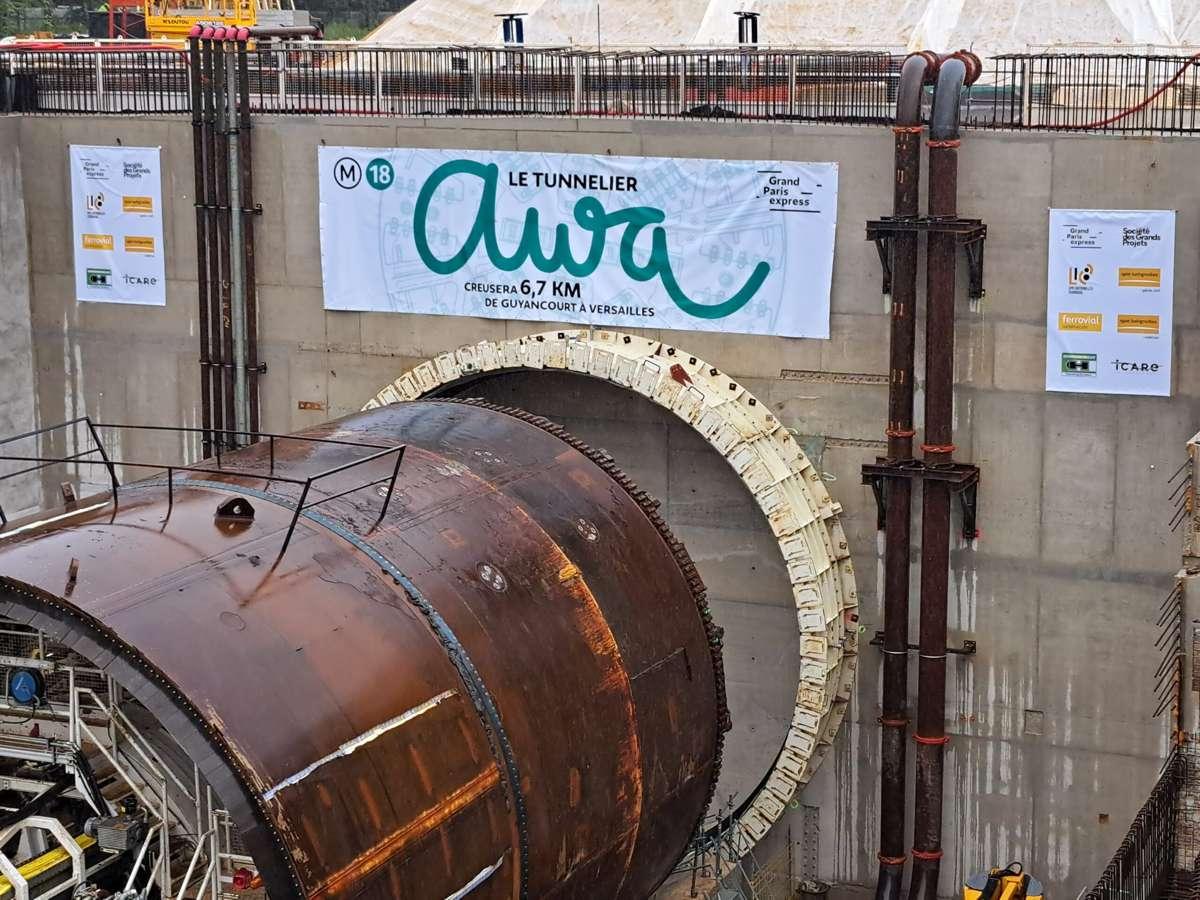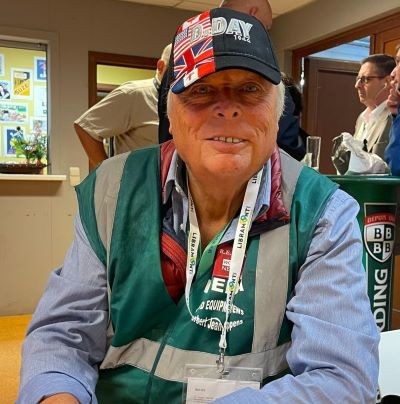R.E.News International-Ferrovial specifies Renewable Sourced Energy during Paris Metro Project
 05/06/24-FR-English-NL-footer
05/06/24-FR-English-NL-footer
Ferrovial privilégie les énergies renouvelables lors du projet du métro parisien
 Image- Ferrovial
Image- Ferrovial
Ferrovial, à travers sa division Construction, aux côtés de son partenaire français Spie batignolles, a conclu un accord avec Électricité de France (EDF) pour garantir que l'approvisionnement en électricité nécessaire lors des travaux de construction d'un tronçon de la ligne 18 du métro parisien sous sa responsabilité proviendra exclusivement à partir de sources renouvelables.
Les deux sociétés sont en charge de la construction de ce tronçon reliant l'aéroport d'Orly à la ville de Versailles. L'investissement en électricité d'origine renouvelable prévu lors de ces travaux de génie civil sur ce tronçon, dans le cadre du projet du Grand Paris Express, atteindra environ 4 millions d'euros.
L'accord prévoit la fourniture de 25 gigawattheures (GWh), équivalents à l'électricité consommée par une ville de 85 000 habitants, comme Versailles, en trois mois. Sur ce total, 13,5 GWh seront utilisés pour faire fonctionner le tunnelier et le reste pour faire fonctionner les équipements auxiliaires nécessaires à la construction. EDF a fourni au consortium la garantie que l'électricité proviendra de sources renouvelables. L'accord permettra d'éviter l'émission de 7 396 tonnes de CO2.
Pour contribuer à réduire l'empreinte carbone, le consortium utilisera un tunnelier à densité variable déjà en place qui a servi à creuser le tronçon précédent.
« La division Construction de Ferrovial s'est fermement engagée à ce que d'ici 2025, tous les projets pour lesquels nous disposons d'une capacité de décision utiliseront 100 % d'énergie renouvelable. Nous travaillons également à reproduire cet engagement en faveur de la durabilité dans des projets avec des partenaires, afin d'impliquer toute la chaîne de valeur », a déclaré Ignacio Gastón, PDG de Ferrovial Construction.
La technologie utilisée dans le tunnelier, qui a été nommé lors d'une cérémonie le 29 mai, permettra de réutiliser les matériaux excavés (principalement du sable) dans d'autres phases du projet, conformément au Plan d'économie circulaire de Ferrovial.
La stratégie climatique de Ferrovial continue d’être l’un des principes directeurs des opérations de l’entreprise. En témoigne sa reconnaissance par le CDP et le Dow Jones Sustainability Index comme un leader mondial en matière de responsabilité environnementale. Cet accord fait partie de la feuille de route de Ferrovial pour atteindre l’objectif soutenu par le SBTi de réduire ses émissions de 35,3 % en termes absolus d’ici 2030 et d’atteindre la neutralité d’ici le milieu du siècle. Conformément à ces objectifs, Ferrovial a réduit ses émissions de 45,5 % entre 2009 et 2023.
Projet Grand Paris Express
Les travaux du tronçon de la ligne 18 reliant l'aéroport d'Orly à Versailles Chantiers ont été attribués à Ferrovial en groupement avec Spie en avril 2022. Le contrat, d'un montant de 428 millions d'euros, comprend le creusement d'un tunnel de 6,7 kilomètres entre les gares de Guyancourt et Versailles – Chantiers, en l'ouest parisien, ainsi que la construction de trois gares et de huit ouvrages annexes. Il fait partie du projet du Grand Paris Express, le plus grand projet d’infrastructure d’Europe, qui prévoit l’ajout de 68 nouvelles stations et 200 kilomètres de lignes au métro parisien. L’infrastructure devrait être opérationnelle en 2030.
Le projet renforce l’empreinte de Ferrovial en France. L’entreprise est présente en France depuis 2013 et a exécuté huit contrats dans le cadre d’ITER, la plus grande installation expérimentale de fusion au monde, dont l’objectif est de rechercher la faisabilité de l’énergie de fusion.
NJC.© Info Ferrovial
------------------------------------------------------------------------------------------------------------------
 05/06/24-English
05/06/24-English
Ferrovial specifies Renewable Sourced Energy during Paris Metro Project
 Image- Ferrovial
Image- Ferrovial
Ferrovial, through its Construction division, alongside its French partner, Spie batignolles, have reached an agreement with Électricité de France (EDF) to ensure that the electricity supply required during construction work on a section of Paris Metro line 18 under its responsibility will come exclusively from renewable sources.
Both companies are in charge of the construction of this section connecting Orly airport to the city of Versailles. The investment in electricity from renewable sources planned during this civil engineering work on this section, as part of the Grand Paris Express project, will reach approximately 4 million euros.
The agreement provides for the supply of 25 gigawatt hours (GWh), equivalent to the power used by a city of 85,000 people, such as Versailles, in three months. Of the total, 13.5 GWh will be used to drive the tunnel boring machine and the rest to operate the ancillary equipment required for construction. EDF has provided the consortium with a guarantee that the electricity will come from renewable sources. The deal will avoid the emission of 7,396 tons of CO2.
To contribute to reducing the carbon footprint, the consortium will use a variable density tunnel boring machine already in place that was used to dig the previous section.
“Ferrovial’s Construction division has made a firm commitment that, by 2025, all projects where we have decision-making capacity will use 100% renewable energy. We are also working to replicate this commitment to sustainability in projects with partners, in order to involve the entire value chain,” said Ignacio Gastón, CEO of Ferrovial Construction.
The technology used in the tunnel boring machine, which has been named in a ceremony on May 29, will make it possible to re-use the excavated material (mainly sand) in other phases of the project, in line with Ferrovial’s Circular Economy Plan.
Ferrovial’s climate strategy continues to be one of the guiding principles of the company’s operations. This is evidenced by its recognition by CDP and the Dow Jones Sustainability Index as a world leader in environmental responsibility. This agreement is part of Ferrovial’s roadmap to achieve the SBTi-supported goal of reducing its emissions by 35.3% in absolute terms by 2030, and reaching neutrality by mid-century. In line with these goals, Ferrovial reduced its emissions by 45.5% between 2009 and 2023.
Grand Paris Express project
Work on the section of line 18 connecting Orly Airport to Versailles Chantiers was awarded to Ferrovial in consortium with Spie in April 2022. The 428-million-euro contract, comprises digging a 6.7-kilometer tunnel between the Guyancourt and Versailles – Chantiers stations, in western Paris, as well as building three stations and eight ancillary structures. It is part of the Grand Paris Express project, Europe’s largest infrastructure project, which involves adding 68 new stations and 200 kilometers of line to the Paris subway system. The infrastructure is scheduled to become operational in 2030.
The project strengthens Ferrovial’s footprint in France. The company has been operating in France since 2013, having executed eight contracts in ITER, the world’s largest experimental fusion facility, whose goal is to research the feasibility of fusion energy.
NJC.© Info Ferrovial
---------------------------------------------------------------------------------------------------------------
 05/06/24-NL
05/06/24-NL
Ferrovial specificeert hernieuwbare energie tijdens het Metro Project in Parijs
 Image- Ferrovial
Image- Ferrovial
Ferrovial heeft via zijn divisie Bouw samen met zijn Franse partner Spie batignolles een overeenkomst bereikt met Électricité de France (EDF) om ervoor te zorgen dat de elektriciteitsvoorziening die nodig is tijdens de bouwwerkzaamheden aan een deel van de Parijse metrolijn 18 onder haar verantwoordelijkheid exclusief zal komen uit hernieuwbare bronnen.
Beide bedrijven zijn verantwoordelijk voor de aanleg van dit gedeelte dat de luchthaven Orly verbindt met de stad Versailles. De geplande investering in elektriciteit uit hernieuwbare bronnen tijdens deze civieltechnische werkzaamheden op dit traject, als onderdeel van het Grand Paris Express-project, zal ongeveer 4 miljoen euro bedragen.
De overeenkomst voorziet in de levering van 25 gigawattuur (GWh), wat overeenkomt met het stroomverbruik van een stad met 85.000 inwoners, zoals Versailles, in drie maanden. Van het totaal zal 13,5 GWh worden gebruikt om de tunnelboormachine aan te drijven en de rest om de aanvullende apparatuur te bedienen die nodig is voor de bouw. EDF heeft het consortium de garantie gegeven dat de elektriciteit uit hernieuwbare bronnen zal komen. Door de deal wordt de uitstoot van 7.396 ton CO2 vermeden.
Om bij te dragen aan het verkleinen van de ecologische voetafdruk zal het consortium een tunnelboormachine met variabele dichtheid gebruiken die al op zijn plaats stond en die werd gebruikt om het vorige gedeelte te graven.
“De bouwdivisie van Ferrovial heeft de vaste toezegging gedaan dat tegen 2025 alle projecten waar we besluitvormingscapaciteit hebben, 100% hernieuwbare energie zullen gebruiken. We werken er ook aan om deze toewijding aan duurzaamheid te repliceren in projecten met partners, om de hele waardeketen erbij te betrekken”, aldus Ignacio Gastón, CEO van Ferrovial Construction.
De technologie die wordt gebruikt in de tunnelboormachine, die tijdens een ceremonie op 29 mei zijn naam heeft gekregen, zal het mogelijk maken om het uitgegraven materiaal (voornamelijk zand) te hergebruiken in andere fasen van het project, in lijn met het Circulaire Economie Plan van Ferrovial.
De klimaatstrategie van Ferrovial blijft een van de leidende principes van de activiteiten van het bedrijf. Dit blijkt uit de erkenning door CDP en de Dow Jones Sustainability Index als wereldleider op het gebied van milieuverantwoordelijkheid. Deze overeenkomst maakt deel uit van de routekaart van Ferrovial om het door de SBTi gesteunde doel te bereiken om de uitstoot in absolute termen tegen 2030 met 35,3% te verminderen en tegen het midden van de eeuw neutraliteit te bereiken. In lijn met deze doelstellingen heeft Ferrovial zijn uitstoot tussen 2009 en 2023 met 45,5% verminderd.
Groot Paris Express-project
De werkzaamheden aan het gedeelte van lijn 18 dat de luchthaven Orly verbindt met Versailles Chantiers werd in april 2022 in consortium met Spie gegund aan Ferrovial. Het contract ter waarde van 428 miljoen euro omvat het graven van een tunnel van 6,7 kilometer tussen de stations Guyancourt en Versailles – Chantiers, in westelijk Parijs, evenals de bouw van drie stations en acht ondersteunende structuren. Het maakt deel uit van het Grand Paris Express-project, het grootste infrastructuurproject van Europa, waarbij 68 nieuwe stations en 200 kilometer lijn aan het Parijse metrosysteem worden toegevoegd. De infrastructuur moet in 2030 operationeel zijn.
Het project versterkt de voetafdruk van Ferrovial in Frankrijk. Het bedrijf is sinds 2013 actief in Frankrijk en heeft acht contracten uitgevoerd in ITER, 's werelds grootste experimentele fusie-installatie, die tot doel heeft de haalbaarheid van fusie-energie te onderzoeken.
NJC.© Info Ferrovial
-------------------------------------------------------------------------------------------------------------------
Date de dernière mise à jour : 04/06/2024















